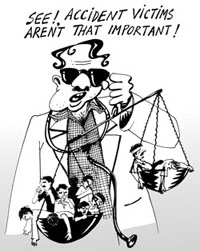Empathy first

--------------------------------------------------------------------------------------------------------
MRIDULA GARG
indian society, which is on the path of technological development is afflicted by many ills. But we tend to ignore one widespread malady that is a corollary of computer literacy and the facility of computing data. This is the tendency of modern educated Indians to reduce everything to a statistic - particularly death.
Recently, a renowned journalist declared in a seminar that since 7,000 people died every year in Delhi due to vehicular pollution and only 600 in road accidents, clearly road accidents were not important. Does it not then clearly follow that it is perfectly all right for the government not to revoke the mandatory use of helmets for two-wheeler riders. Just as it is all right for car drivers not to be made to wear seat belts. Or for cyclists and pedestrians not to be given separate lanes.Or for buses and cars to be driven on full beam inside the city at night. As deaths due to road accidents have been deemed unimportant, victims can be conveniently forgotten.
A few days later, I was told by a writer that my attempt to save a few lives by dispensing medicines was an exercise in futility. Not because it would not cure them, but because the number of lives it would save was small. Does it not then follow that doctors need not try to save a patient's life because it is, after all, only one life. They can content themselves with prescribing routine treatment and charging fees. But they need not try to go to the root of the problem and find a cure. That is indeed the attitude of an increasing number of our doctors. Must we commend it?
Our government has always played this heartless number game to get away with doing nothing. Whenever there is an epidemic, accident or some disaster, much more energy is spent in computing and denying the number of deaths than in fighting the calamity. Politicians and bureaucrats have long been recognised as lacking in humaneness. It is dangerous if journalists, writers and social activists also fall prey to the same callousness, in the name of data compilation.
We are told that the people in big cities are callous and thus do not come forward to help accident victims. But it is counter-productive to shift the blame on to the average citizen. He does not give aid because he does not know what to do. No one has ever told him. There is no set procedure that he can follow. Not only must trauma treatment facilities be made available, they must also be well advertised. The procedure for giving medical aid has to be quick and simple and everyone must know that it is so - in law and practice. It is no use running to the courts and getting a judgment delivered. Laws have not only to be passed. They have to be implemented. Governments have to be forced to govern. The judiciary may pull up the executive now and then. But day-to-day responsibilities will be fulfilled only if the executive has a long-term, detailed implementation policy.
Some time ago I attended a television show on road accidents, where everyone put the blame for the neglect of accident victims on the common citizen. The Delhi's health minister even declared that enough trauma facilities, ambulances and medical procedures were available to cope with the situation. That nobody knew about them was another matter. When I insisted that if facilities were indeed available, they should be widely advertised, he retorted that he had not come there to be "insulted". This shows the low value that the public servants place on human life. Let not the media join them in the callousness.
We must remember that we respond to a person and not a statistic. We can only save one life at a time. And each death is significant for the person whose life is lost and his family. If today I lose my children in a road accident, tomorrow it may be your turn. Being rich and famous will not help. Accidents happen as much to brand new air-conditioned limos as to old jalopies. The only way to save yourself is by impressing upon people to use safety devices. Start with using helmets and seat belts, whether the law says so or not. Then go on to getting the law changed to fall in line with other civilised countries. Even Third World countries like China have made the use of helmets and seat belts mandatory.
----------------------------------------------------------------------------------------------------------
Mridula Garg is a Hindi novelist and short story writer based in New Delhi
